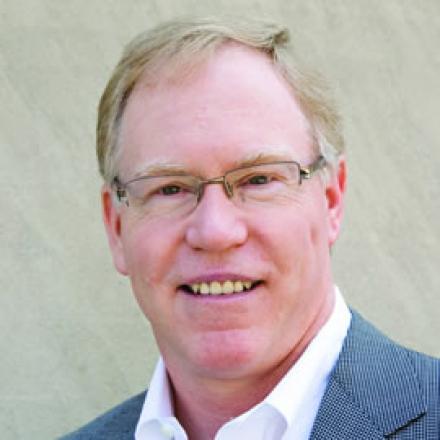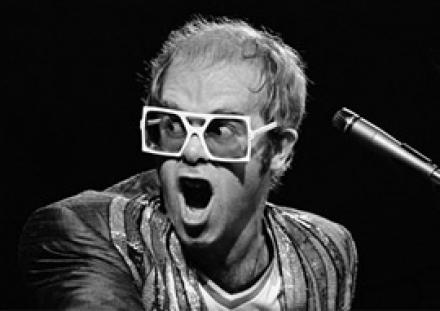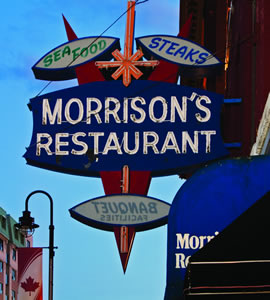The Seventies: Sports, Socials and Stairway to Heaven
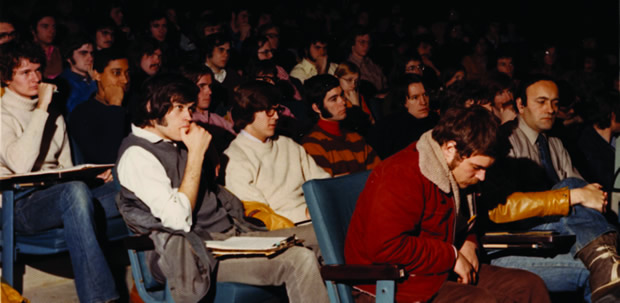
When Peter Kingston and Mike Gilbert of the Commerce Class of 1978 arrived in 1974, they found a campus that would be at once strange and familiar to today’s students. Structures such as Mackintosh-Corry Hall, the largest complex on campus, and McArthur Hall on the West Campus, home to the Faculty of Education, had just been built, products of a flurry of construction. The business school was centred in Dunning Hall, while Victoria School – the 1892 heritage brick structure that is now part of QSB’s Goodes Hall home – was still serving its original purpose as a public elementary school.
Commerce’78 men still hold the record for BEWS sports participation
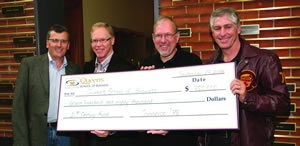 Gia Steffensen, Mike Gilbert and Peter Kingston present their 30th Anniversary class gift to Dean David Saunders Then, as now, courses were demanding and exam-time stressful, but unlike the wired classrooms of today, teaching technologies were decidedly low-tech. Legendary business professors such as Frank Collom, Rick Jackson,Merv Daub and Carl Lawrence relied on textbooks, chalkboards and overhead projectors as teaching aids; email, videoconferencing and the World Wide Web were still years away. Most Commerce students took a basic computer course that required them to write simple programs, and Mike recalls lining up late at night with scores of engineering and computer science students to slip computer punch-cards into the handful of mainframes on campus.
Gia Steffensen, Mike Gilbert and Peter Kingston present their 30th Anniversary class gift to Dean David Saunders Then, as now, courses were demanding and exam-time stressful, but unlike the wired classrooms of today, teaching technologies were decidedly low-tech. Legendary business professors such as Frank Collom, Rick Jackson,Merv Daub and Carl Lawrence relied on textbooks, chalkboards and overhead projectors as teaching aids; email, videoconferencing and the World Wide Web were still years away. Most Commerce students took a basic computer course that required them to write simple programs, and Mike recalls lining up late at night with scores of engineering and computer science students to slip computer punch-cards into the handful of mainframes on campus.
 Q-BET’77 Conference panelist John Munro shakes hands with conference chair David Court, BCom’78, with panelists William Dimma and Shirley Carr in the background.Classmate Karen Caskey, one of 53 women in the class of 160, consulted the diary she kept during her student days to share some of her recollections. “Books cost a mint – $45 per semester,” read one entry. “Just finished calculus and accounting assignments – could have done it in one-third the time if I had a calculator. I do my homework in the Common Room, as it’s hard to concentrate with the clicking of typewriters.” Elections were a frequent occurrence. Karen’s diary noted: “Decided to run for Commerce Senator for next year and had to campaign all last week and this week. I wasn’t going to campaign so much, but my worthy opponent Nicol MacNicol went all out on the posters, so I had to follow suit.” Karen reports that she not only won that election, but was re-elected the following year.
Q-BET’77 Conference panelist John Munro shakes hands with conference chair David Court, BCom’78, with panelists William Dimma and Shirley Carr in the background.Classmate Karen Caskey, one of 53 women in the class of 160, consulted the diary she kept during her student days to share some of her recollections. “Books cost a mint – $45 per semester,” read one entry. “Just finished calculus and accounting assignments – could have done it in one-third the time if I had a calculator. I do my homework in the Common Room, as it’s hard to concentrate with the clicking of typewriters.” Elections were a frequent occurrence. Karen’s diary noted: “Decided to run for Commerce Senator for next year and had to campaign all last week and this week. I wasn’t going to campaign so much, but my worthy opponent Nicol MacNicol went all out on the posters, so I had to follow suit.” Karen reports that she not only won that election, but was re-elected the following year.
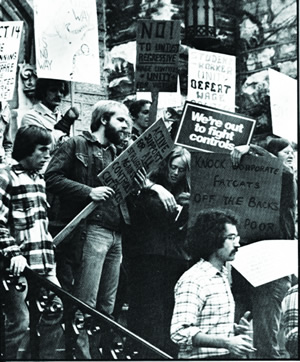 Peter and Mike remember a remarkably cohesive group of young men and women whose collective accomplishments continue to leave their mark on QSB. It was the Comm’78 class that organized the first Queen's Conference on the Business Environment Today (Q’BET), an annual event that still brings together students and business leaders from across Canada to provide a forum for learning about the national business climate. The highlight of the inaugural gathering in November 1977 was a panel discussion featuring John Munro, then Minister of Labour under Prime Minister Pierre Trudeau; Shirley Carr, the outspoken head of the Canadian Labour Congress; and William Dimma, then-President of the Toronto Star. “It was a real coup to get those three together in the same room,” says Mike, who was on the founding executive committee.
Peter and Mike remember a remarkably cohesive group of young men and women whose collective accomplishments continue to leave their mark on QSB. It was the Comm’78 class that organized the first Queen's Conference on the Business Environment Today (Q’BET), an annual event that still brings together students and business leaders from across Canada to provide a forum for learning about the national business climate. The highlight of the inaugural gathering in November 1977 was a panel discussion featuring John Munro, then Minister of Labour under Prime Minister Pierre Trudeau; Shirley Carr, the outspoken head of the Canadian Labour Congress; and William Dimma, then-President of the Toronto Star. “It was a real coup to get those three together in the same room,” says Mike, who was on the founding executive committee.
Other notable achievements included writing a new Commerce Society constitution and creating separate vice-president positions for internal and external matters. Class members also contributed to the launch of Inquiry on Business, the School’s first magazine and predecessor of QSB Magazine.
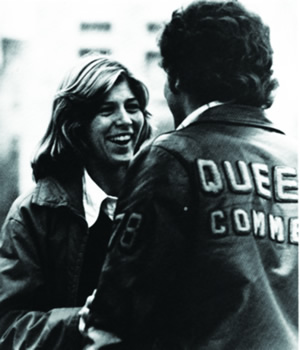 All-night house parties, a now-legendary Commerce Stag, and participation in BEWS/WIC intramural sports were favourite activities. Since few of them excelled in any particular sport, the Class of ’78 tried to score points for participation – sometimes by extraordinary means. Peter once rented all the cross-country skis in town to guarantee that the class would dominate a Nordic ski race. Sometimes point-getting meant taking part in less mainstream sports – horseshoes, for instance, or, as Mike once did, in ping-pong. “There was a tournament in the basement of Victoria Hall, and I just used the old beat-up paddles they had there,” he says. “My opponent showed up with a special paddle in a little zippered case. I knew right away I was in trouble, and he smoked me. But whenever you found yourself in these situations, you just had to remind yourself that you were there for your team.”
All-night house parties, a now-legendary Commerce Stag, and participation in BEWS/WIC intramural sports were favourite activities. Since few of them excelled in any particular sport, the Class of ’78 tried to score points for participation – sometimes by extraordinary means. Peter once rented all the cross-country skis in town to guarantee that the class would dominate a Nordic ski race. Sometimes point-getting meant taking part in less mainstream sports – horseshoes, for instance, or, as Mike once did, in ping-pong. “There was a tournament in the basement of Victoria Hall, and I just used the old beat-up paddles they had there,” he says. “My opponent showed up with a special paddle in a little zippered case. I knew right away I was in trouble, and he smoked me. But whenever you found yourself in these situations, you just had to remind yourself that you were there for your team.”
The strategy of luring as many bodies as possible to the various playing arenas resulted in long-term bragging rights: the 100 or so males in Commerce’78 still hold the record for BEWS sports participation.
Late nights were spent slipping computer punch-cards into the few mainframes on campus.
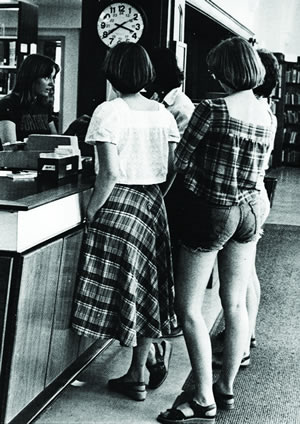 In fact, says Peter, sports were an opportunity for business students in those days to learn the value of teamwork, now a common learning approach at QSB. For the Class of ’78, the beyond-the-classroom activities also helped to foster an enduring sense of collegiality; no fewer than a third of them routinely attend the class’s five-year reunions, and many alumni who have gone on to successful careers still contribute to the School by guest-lecturing, mentoring and hiring Commerce graduates. They also contribute financially. The class made a standard-setting class donation of $200,000 for their 20th reunion, and an astonishing $784,000+ for their reunion ten years later.
In fact, says Peter, sports were an opportunity for business students in those days to learn the value of teamwork, now a common learning approach at QSB. For the Class of ’78, the beyond-the-classroom activities also helped to foster an enduring sense of collegiality; no fewer than a third of them routinely attend the class’s five-year reunions, and many alumni who have gone on to successful careers still contribute to the School by guest-lecturing, mentoring and hiring Commerce graduates. They also contribute financially. The class made a standard-setting class donation of $200,000 for their 20th reunion, and an astonishing $784,000+ for their reunion ten years later.
- 1 of 3
- ›


